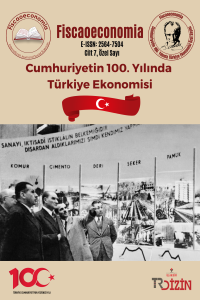İktisadi Bağımsızlık Çerçevesinde 1929 Gümrük Tarifesinin Ekonomi Politiği
The Political Economy of the 1929 Tariff in the Framework of Economic Independence
Author(s): Mustafa Duman, Hasret Yağmur AydinSubject(s): Economic history, Political history, Political economy, Interwar Period (1920 - 1939)
Published by: Ahmet Arif Eren
Keywords: Foreign Trade Policy; Capitulations; Lausanne Treaty; Protectionism;
Summary/Abstract: Foreign trade policies are one of the important tools used to determine the development policies of a country and to gain competitive power for the domestic producer. The Republic of Turkey, which was founded in 1923, was able to achieve its economic independence in 1929 due to the capitulation policy of the Ottoman Empire on the basis of provisionism. In the Trade Regime Negotiations in Lausanne, it was decided to implement a 5-year temporary regime process as a result of tough negotiations with England and France, who wanted a 20-year temporary regime. During the period when the temporary regime was in effect, it was decided to implement the "1916 Tariff" based on a specific duty, which was created after the unilateral abolition of the capitulations on the grounds of World War I. Obtaining the independence to determine foreign trade policy before the Great Depression of 1929 provided an important economic advantage for the country at a time when protectionism was on the rise. In the study, the effects of the 1838 Anglo-Ottoman Treaty and 1861 System Trade agreements on the emergence of a foreign-dependent economy, the protectionist aspect of the 1916 Customs Tariff that became dysfunctional due to high inflation, the destruction of the subsistence economy with the capitalist transformation triggered by the increase in foreign trade, the Trade Regime Commission, document number 5, in which the decisions regarding the trade regime after the Treaty of Lausanne were taken, the class conflict based on the Supreme Economic Council and chambers before the 1929 Customs Tariff, and the protectionist aspect of the 1929 Customs Tariff will be discussed. Although the main factor in the emergence of a foreigndependent economy is capitulations, it can be stated that in a period when mercantilist policies were effective, the state's encouraging imports and controlling exports in order to keep the goods abundant in the foreign trade market led to the emergence of a dependent economy. Therefore, it can be stated that capitulations both triggered the process of capitalism through trade and also caused the termination of economic practices that did not reflect the realities of the age. As a result of the struggle against the capitulations, it was understood that economic independence should not be compromised and this motivation became the driving force in the Lausanne negotiations. It can be stated that the first actions of industrialization moves were created in this period, with the independence of foreign trade policy in 1929 in accordance with the Treaty of Lausanne.
Journal: Fiscaoeconomia
- Issue Year: 7/2023
- Issue No: spec. 1
- Page Range: 152-178
- Page Count: 27
- Language: Turkish

